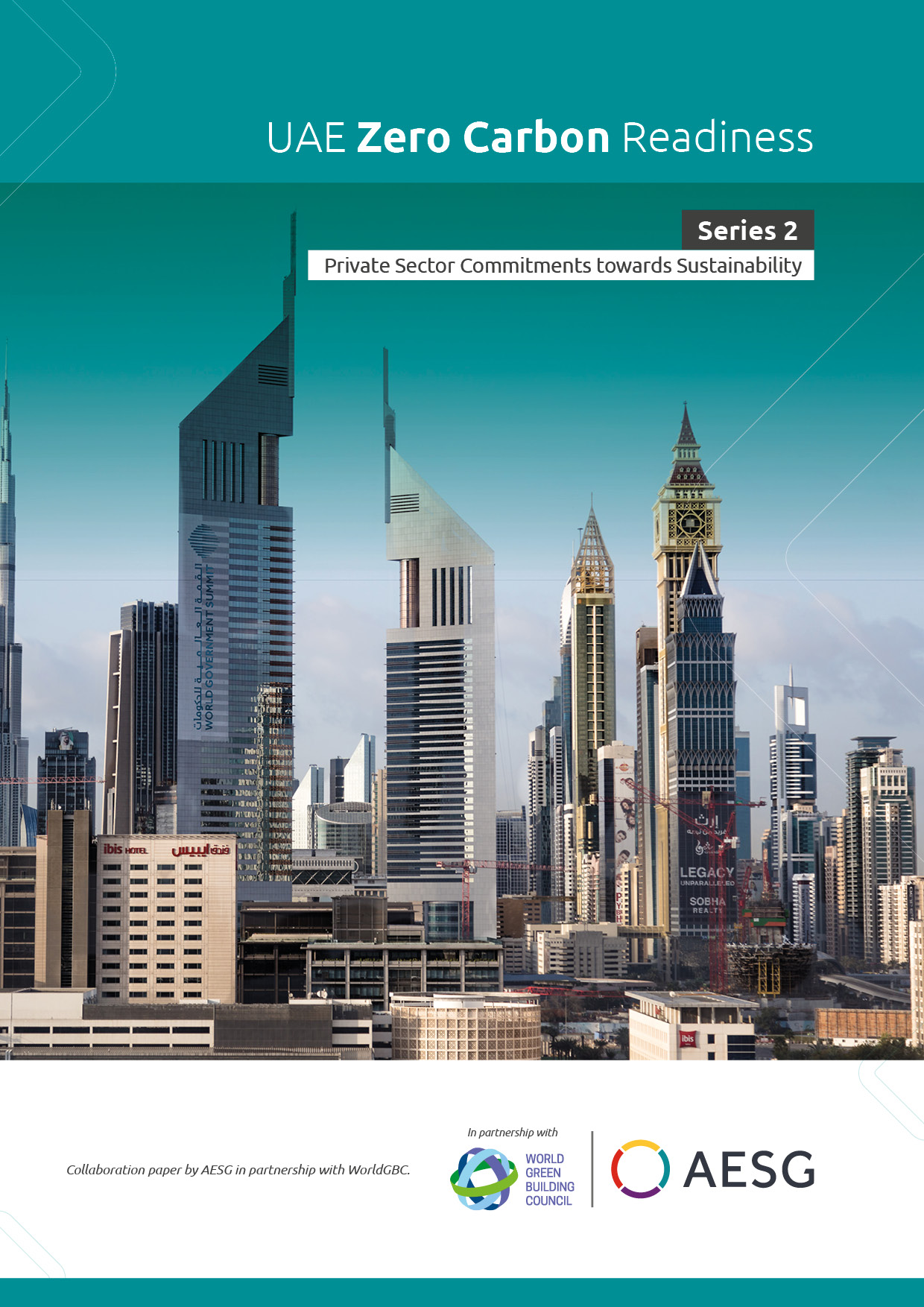
Foreword
This article has been created by AESG in collaboration with the World Green Building Council (WorldGBC) and its Middle East North Africa Regional Partners and Net Zero Collaborators through interviews and surveys from industry experts. It is the second of four articles that highlight the achievements of advancing net zero in the built environment.
This report is a result of interviews and surveys with industry experts in the UAE. We’d like to thank them for contributing to this collaborative thought leadership series:
The Progress
Private Sector Commitments towards Sustainability
In the past 5 years we have been witnessing an increasing number of commitments towards sustainability and net zero goals. These commitments have been led by the Government and driven by National Agendas, UAE’s Year of Sustainability and the COP28 hosted in the UAE. More recently the private sector has issued a number of public commitments, coming from large local and international manufacturers, developers, construction companies, finance institutions and others, completing the value chain loop of industry decarbonisation. These commitments are followed by internal or external targets, at first focused on operational carbon reduction (fuel, electricity and cooling) and increasingly switching the focus on scope 3, waste, water and embodied carbon reduction.
Many companies in the UAE have sustainability strategies / frameworks in place, while conducting ESG reporting as per GRI, SDG or CPD/SBTi frameworks.
Companies are creating a ‘business as usual’ baseline – what the carbon footprint would be without any sustainability requirements or initiatives, and then develop strategies to drive the footprint reduction as much as possible. This included setting key performance indicators (KPIs) that all projects must achieve across a range of focus areas, including energy and carbon. There is also a continuing exploration of ways to increase the use of renewable energy to further reduce the carbon footprint.
The industry is implementing energy efficiency for more than a decade
There is significant progress on setting strict energy efficiency requirements, such as a minimum of 40% reduction in buildings energy consumption, which can be achieved through a sustainable design and optimising operation and maintenance of buildings.
The Building Sector in the UAE consumes more than 65% of total energy for cooling. This is being tackled by improving specifications of the building envelope (better thermal resistance and glazing performance) and increasing energy efficiency (equipment and HVAC equipment).
Testing and adoption of cutting-edge cooling technologies will greatly reduce operational carbon (i.e. radiant cooling, geothermal cooling). On-site renewable technologies are being implemented.
Waste management and vehicle electrification
Many private sector companies are already exploring the ways to reduce their fuel and waste emissions as well.
There are a large number of initiatives being implemented line on-site recycling facilities, waste-to-energy and adoption of EVs (trucks).
The Learnings
Data monitoring and management as a first stepping stone to decarbonisation
We cannot manage what we cannot measure. As soon as buildings become operational, a challenge arises to the companies, which is the data management plan.
This is due to the high volume of data that needs to be collected for verification and validation in order for it to be used for calculations for operational carbon emissions.
A struggle that arises from lack of quality monitoring of energy, water, waste but also suppliers companies are working with. Having custom designed data management plans and tools would support carbon emission monitoring and verification.
The data management plans and tools need to consider appropriate reporting standards, and business structure of the reporting company, ensuring governance is an integral part of the data management.
Data-driven decision-making deserves a spotlight. Employing advanced analytics and digital tools can enhance energy management, identify inefficiencies, and guide targeted interventions.
While the UAE building and construction industry has made remarkable progress, these key hotspots offer us a roadmap for future-focused action.
The Opportunity
Public Commitment, reporting of decarbonisation measures and targets
When leading companies publish their Net Zero Targets, this vision drives other businesses to move forward in doing initiatives and programs to meet that aspirational target.
Few businesses in the UAE market lead the way in their carbon emissions reductions or high operational energy savings.
This enables them to obtain certifications in their new construction buildings such as LEED Zero or ILFI Net Zero Energy certification and opens the door for others to learn from example and follow the same path.
Renewable energy comes at a premium
In this region, the main opportunity is related to policies that regulate the use of renewable energy and the capital cost of systems that reduce carbon emissions.
For example, installing renewable energy systems has an initial high premium compared to grid power.
This is typically challenged in buildings where unit ownership will be transferred to other owner(s), so that the main developer would not bear the responsibility for operational energy costs.
For additional insights on Carbon Readiness please read:
UAE Zero Carbon Readiness Series 1: Governmental Actions in Support of the Net Zero Agenda
UAE Zero Carbon Readiness Series 3: Decarbonising through Sustainable Design
Collaboration paper by AESG in partnership with WorldGBC.
AESG is a specialist consultancy, engineering and advisory firm with offices in London, Dubai, Abu Dhabi, Riyadh and Singapore working on projects throughout Europe, Asia and Middle East.
We pride ourselves as industry leaders in each of the services that we offer. We have one of the largest dedicated teams with decades of cumulative experience in sustainable design, sustainable engineering, fire and life safety, façade engineering, commissioning, digital delivery, waste management, environmental consultancy, strategy and advisory, acoustics, cost management and carbon management.

Associate Director Strategy and Advisory, AESG
Tamara is an Associate Director – Strategy and Advisory at AESG. She holds a Masters’ degree in Environmental Engineering with specialization in the fields of Energy Efficiency, GHG Emissions and Decarbonisation. Her sustainability journey in the UAE started with a 6-year engagement with Dubai Government, as part of the DSM PMO office, implementing the Energy Efficiency (DSM) Strategy in Dubai across 11 programmes and more than 10 key government sector stakeholders and private sector market players.
She has led and supported with the design and execution of key activities: DSM PMO office establishment (institutional mechanisms & procedures, organisational objectives, priorities, budget requirements), implementation of operational plans and roadmaps, DSM savings monitoring and evaluation (via data collection, modelling, top management presentations), Capacity and Awareness Programmes.
As part of the AESG Strategy & Advisory team, she has expanded her expertise to accompany government and private sector to plan and implement their Net Zero/Decarbonisation, ESG and Sustainability Journey as it evolves over time. She supports clients to understand their key Net Zero drivers, reporting requirements, following with the design of a tailored Net Zero strategies, roadmaps, action plans, timelines, budget requirements and supporting tools to successfully implement their decarbonisation initiatives and achieve Net Zero goals.
For more information or to arrange a meeting with Tamara Bajic, please email t.bajic@aesg.com